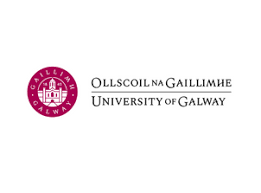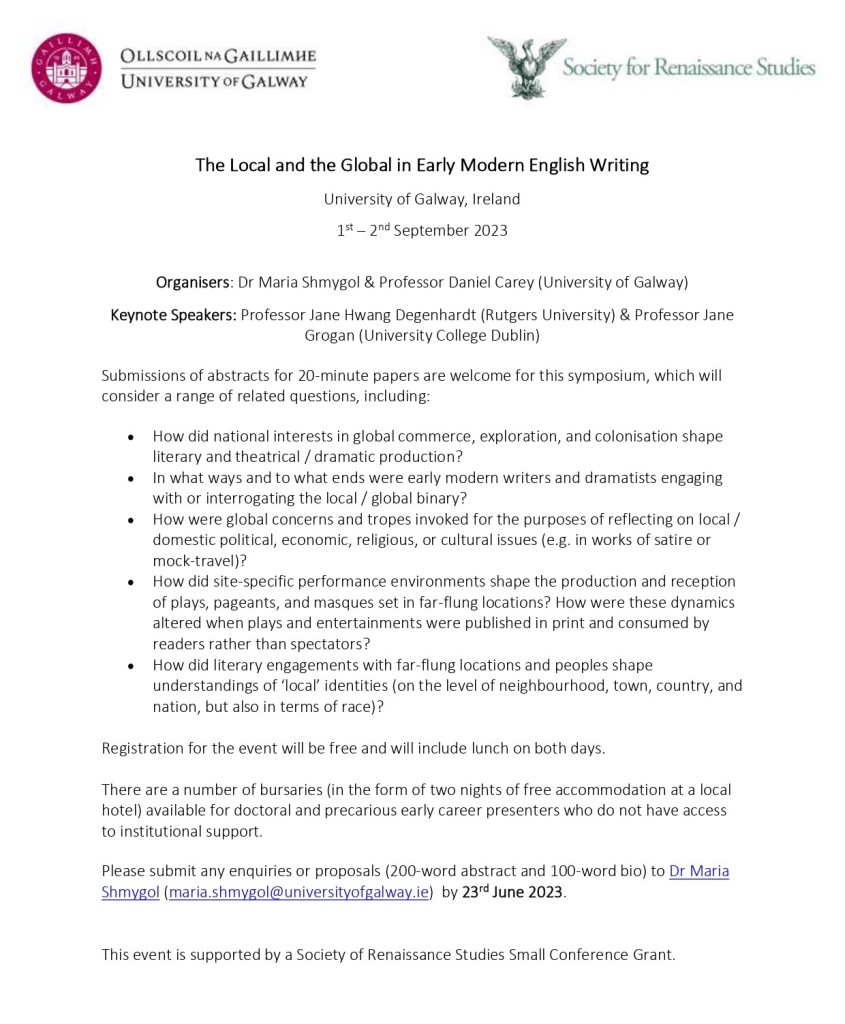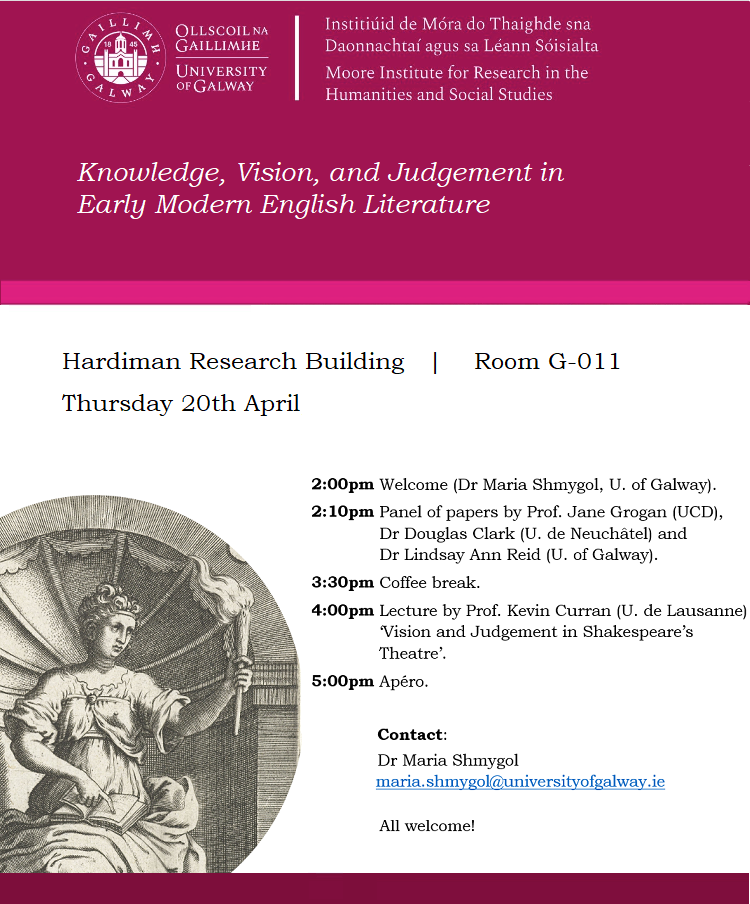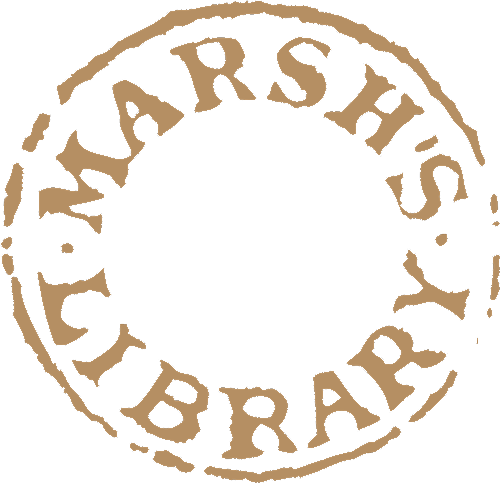PhD Scholarship in Early Modern English Literature – University of Galway
Deadline for applications is 15th April 2024
Full details here: https://mooreinstitute.ie/2024/03/07/phd-scholarship-in-early-modern-english-drama


PhD Scholarship in Early Modern English Literature – University of Galway
Deadline for applications is 15th April 2024
Full details here: https://mooreinstitute.ie/2024/03/07/phd-scholarship-in-early-modern-english-drama




More info at the Moore Institute website here.
12.00-12:45 Arrival
12:45-1:45 Welcome Ramona Wray (QUB)/Jane Grogan (UCD) and Opening Plenary
Andrew Murphy (TCD): ‘Shakespeare comes to Dublin: Culture and colonialism in eighteenth-century Ireland’, Chair: Ramona Wray (QUB)
1:45-2:45pm Marie Curie Projects at IRS
Emer McHugh (QUB), Maria Shmygol (University of Galway), Helen Newsome (UCD), Chair: Ann-Maria Walsh (QUB)
2:45-3:45 New work in Shakespearean Adaptation
Edel Semple (University College Cork), Stephen O’Neill (Maynooth University), Mark Thornton Burnett (QUB), Chair: Edel Lamb (QUB)
3:45-4:15pm Break
4:15-5:15pm PGR Projects at IRS
Hannah Gregg (QUB), Alan Waldron (Maynooth University), Annie Khabaza (UCD), Chair: Anna Graham (QUB)
5:15-6:15pm Closing Plenary
Lillie Arnott (QUB) ‘Witnessing Grief: Sight, Subjectivity and Gender in Early Modern Literature’, Chair: Mark Thornton Burnett (QUB)
6:15-7:30 Reception
For all enquiries on this meeting of the IRS, please contact Dr Ramona Wray.

This week (beginning 18 May) The River-side will post a series of blog posts comprising a student-created online exhibition Mapping Cork: Trade, culture and politics in medieval and early modern Ireland. This online exhibition is curated and overseen by Dr Małgorzata Krasnodębska-D’Aughton, Senior Lecturer, UCC’s School of History and Elaine Harrington, Special Collections Librarian, UCC Library. Four MA in Medieval History students: Andrew […]
The MACMORRIS Project seeks to map the full range of cultural activity in Ireland, across languages and ethnic groups, from roughly 1541 to 1691. It is a 4-year digital-humanities project funded by the Irish Research Council, and based in Maynooth University, Ireland.
The Project is currently seeking to recruit a well-qualified applicant interested in undertaking a research degree at PhD level. The successful candidate will have at least a 2.1 degree at BA and MA level, with a strong scholarly grounding in Renaissance literature and early modern Ireland.
The ideal candidate will have with a background in one or more of the following disciplines: Early Modern English, History, Gaeilge, Modern Languages, Classics, Comparative Literature, Post-/Colonial Studies, Women’s Writing, Archaeology, Environmental Humanities, Library Science, and Information Management.
See Maynooth University website here for details on the funding, possible topics, supervision, deadline etc..
Publication: The Alliance of Pirates: Ireland and Atlantic piracy in the early seventeenth century by Connie Kelleher
In the early part of the seventeenth-century, along the southwest coast of Ireland, piracy was a way of life. Following the outlawing of privately-commissioned ships in 1603 by the new king of England, disenfranchised like-minded men of the sea, many who had been former ‘privateers’, merchant sailors and seamen and who had no recourse but to turn to plunder, joined forces with traditional pirates. With the closing of the ports, they transferred their base of operations from England to Ireland and formed an alliance. Within the context of the Munster Plantation, many of the pirates came to settle, some bringing families. These men and their activities not alone influenced the socio-economic and geo-political landscape of Ireland at that time but challenged European maritime power centres, while also forging links across the North Atlantic that touched the Mediterranean, Northwest Africa and the New World.
Tracing the cultural origins of this particular period in maritime plunder from the late-1500s and throughout its heyday in the opening decades of the 1600s, The Alliance of Pirates analyses the nature and extent of this predation and looks at its impact and influence in Ireland and across the Atlantic. Operating during a period of emerging global maritime empires, when nations across Europe were vying for supremacy of the seas, the pirates built their own highly lucrative and highly potent piratical power base.
Drawing on extensive primary and secondary historical sources Dr Connie Kelleher explores who these pirates were, their main theatre of operations and the characters that aided and abetted them. Archaeological evidence uniquely supports the investigation and provides a tangible cultural link through time to the pirates, their cohorts and their bases.
For more info, see the book on the Cork University Press website. Published April 2020 | 9781782053651 | €30 £27| Hardback |234 x 156mm| 552 pages | 60 illustrations
Dr Connie Kelleher is a State underwater archaeologist with the National Monuments Service and visiting lecturer in underwater archaeology in University College Cork.

The exhibition “Readers & Reputations: The Reception and Circulation of Early Modern Women’s Writing, 1550-1700” will be held in the foyer of the Hardiman Research Building, NUI Galway. The exhibition runs from 16th January to 2nd April 2020.
This exhibition showcases the work of RECIRC and is funded by the Irish Research Council. RECIRC is a 5 year project that has produced a large-scale, quantitative analysis of the reception and circulation of women’s writing from 1550 to 1700, and is funded by the European Research Council. For more on the project, see the RECIRC website, follow the project on Twitter at @RECIRC_ or contact the project’s Principal Investigator Prof Marie-Louise Coolahan.

University College Cork is delighted to announce the call for papers for the 24th annual Borderlines conference on the theme of “Translation and Transformation”. Borderlines XXIV invites abstracts of no more than 250 words on the theme of “Translation and Transformation”. Papers will be twenty minutes of length and can focus on one or both concepts.
We welcome submissions from postgraduates and early career researchers in any discipline relating to the medieval and early modern periods.
Borderlines XXIV invites papers that address the social, historical, literary, religious, and cultural significance of translation and transformation. We welcome papers from researchers in the fields of Anthropology, Archaeology, Codicology, Drama, Digital Humanities, Folklore, History, History of Art, Geography, Languages, Literature, Music, Palaeography, Philosophy, and Theology.
Topics may include, but are not limited to:
All submissions must be received by 3rd February 2020. Submissions must include: an abstract, short bio, and contact information. All submissions and queries can be directed to: BorderlinesXXIV@gmail.com.
Facebook: Borderlines XXIV Twitter: @BorderlinesIE
The 22nd meeting of the Irish Renaissance Seminar will be held in Marsh’s Library, St Patrick’s Close, Dublin 8, and hosted by UCD English on Saturday 12th October 2019.
1.30pm Welcome
1.45pm Natural philosophy and human bodies
Dr Sue Hemmens (Marsh’s Library), ‘Some things worth a philosophical pen’: queries and desiderata relating to Ireland, 1650 to 1700
Dr Harriet Knight (independent scholar), Meaningful chaos: Francis Bacon and Robert Boyle’s Indigested Particulars
Mark Ronan (UCD), From Hal to Henry, ‘breaking through the foul and ugly mists’: Addiction and Maturing Out in the Henriad
3.15pm Break
3.45pm Plenary: Prof. Kevin Killeen (University of York), “The symphonic unknowability of the world: early modern poetics, science and the Book of Job”
4.45pm Response to the afternoon’s papers by Prof. Danielle Clarke (UCD)
We are very grateful for the support of the Society for Renaissance Studies, the World Universities Network and Marsh’s Library.


